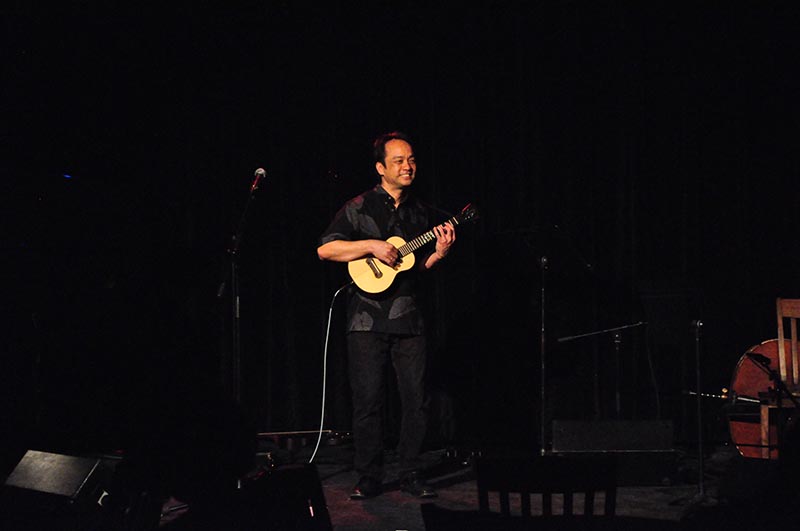Ho Brings Refinement to Ukulele, Other Instruments
A cheerful Daniel Ho smiles at his audience. Ho shared quirky anecdotes during his musically adventurous set Monday night.
April 17, 2015
The multi-talented Daniel Ho quickly figured out who his audience was when he visited the Cat in the Cream Monday night. Everyone from untrained music lovers to experienced Conservatory students sat in the room. Given the audience’s wide range of musical knowledge, Ho managed to balance his on-stage talk between anecdotal explanations of his songs and technical explanations of the rhythms, harmony and forms at work.
Ho, a native Hawaiian currently based in Los Angeles, plays piano, ukulele and slack key guitar. He has received six Grammies as a producer and his album Polani (Pure) was the first ukulele album to be nominated for a Grammy. Ho, who visited Oberlin as part of Asian/ Pacific Islander American Month, sponsored by the Asian American Alliance, delivered an entertaining and virtuosic performance.
Ho described his first song, “On a Gentle Island Breeze,” with an anecdote, in which he noted the sound of wind sifting through rice fields, an accessible explanation for the less-musically-inclined members of the audience.
Today, indie singer-songwriters often appropriate the ukulele to play a few basic chords, severely under-utilizing the potential of the instrument. This was not the case with Daniel Ho, who played the instrument with the dynamic refinement of a classically-trained guitarist. His melodies also resembled the melodies of a classical guitar piece.
After a few songs, Ho discussed the more technical aspects of his music. He explained that his third song, “Amis Rondo,” was a round influenced by an experience with the Amis people, who are indigenous to Taiwan. The song featured a very recognizable theme in the key of A minor, which Ho identified as a pun on the word “Amis.” After “Amis Rondo,” Ho brought up his “new friends,” an ensemble of students consisting of College senior Robin Wong on flute, doubledegree sophomore Timothy Fenton on double bass, Conservatory sophomore Heewon Lee on cello and College sophomore Emily Bang on violin. The ensemble proceeded to perform his song “Haiku,” which featured a call-and-response, contrapuntal exchange between the ukulele and the flute.
Throughout the show, Ho sang praises of Oberlin musicians, especially the students with whom he was performing. He talked about his beginnings as a musician at the Grove School of Music in Los Angeles and how he didn’t bother applying to Oberlin because he knew he couldn’t get in. Ho explained how he had taken months to learn a par ticular polyrhythm only to reveal that Lee, the cellist, had learned the rhythm in one afternoon.
About halfway through the set, Ho changed from his ukulele to a Yamaha silent guitar — which does make noise when plugged in — modeled to reproduce the tone of a Hawaiian slack key guitar. Next came a handful of eclectically influenced songs that ranged from bluesy instrumentals, such as “Slack Tides,” to more pop-influenced songs that included vocals, such as “Living in Paradise,” a song that he mentioned was featured on the show Hawaii Five-O. In another notable moment of his performance, Ho invited his artistic collaborator and friend Amy Ku’uleialoha Stillman on stage to complement his music with traditional hula dancing. Ho finished his set by bringing the ensemble back onstage for a piano piece, “When You Grow Up.” The piece was laden with Elton John-like embellishments and consonant swells in the ensemble and came to an abrupt end. When it was over, Ho kindly shook the hands of all the players and left the stage with grace.

















